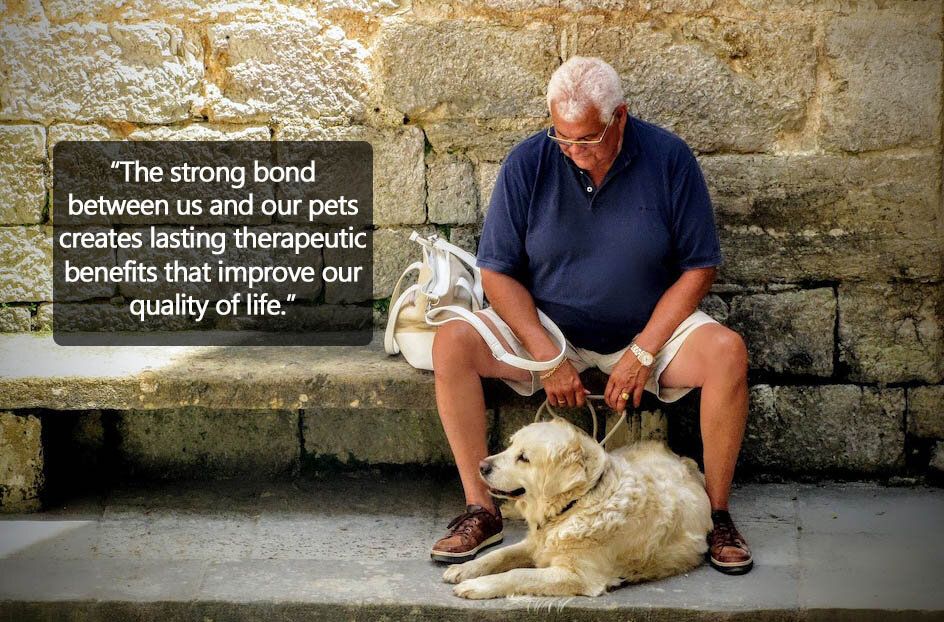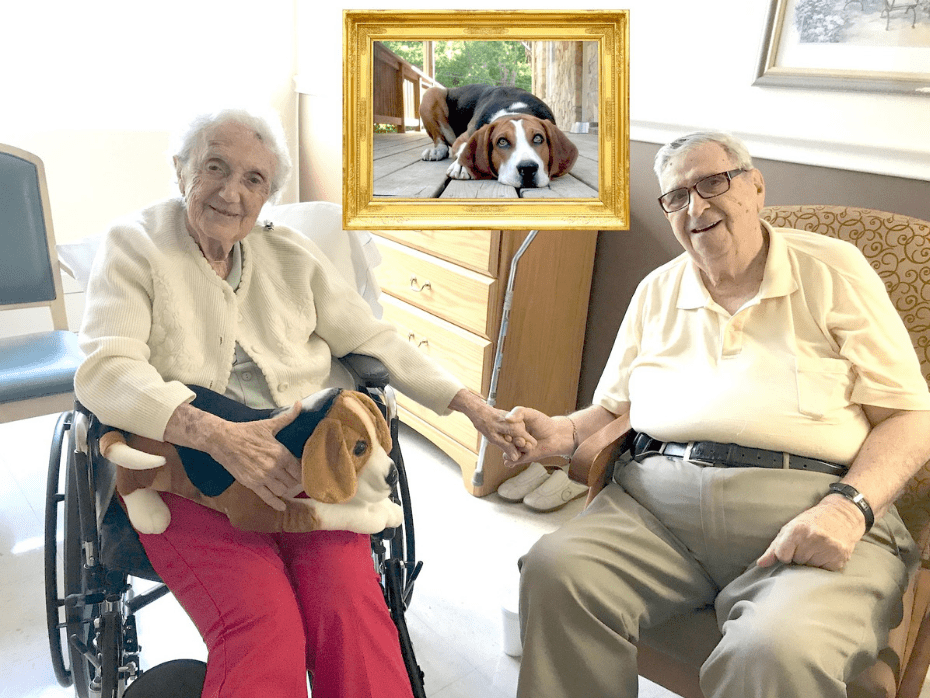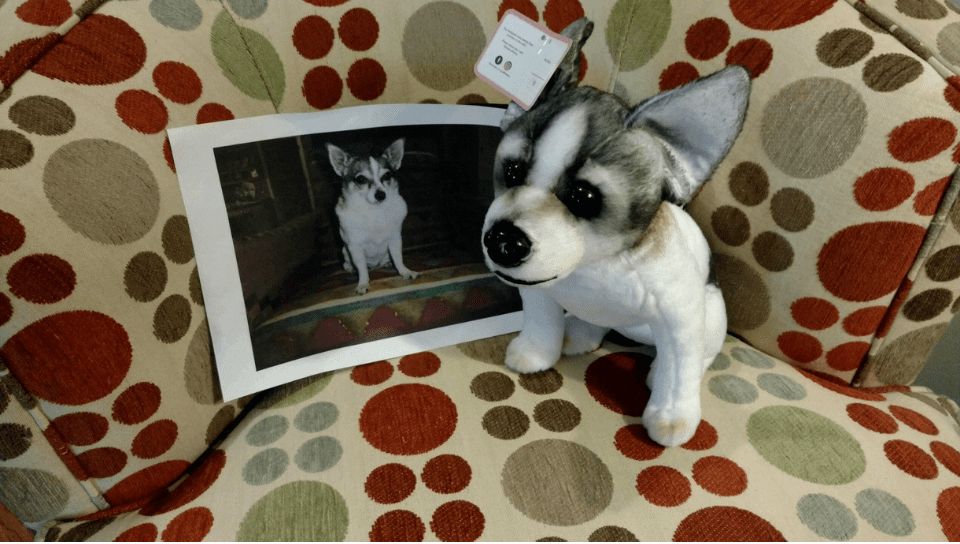Pets & Stuffed Animal Therapy
Study reveals new method to comfort people with dementia: Custom Pet Stuffed Animals

Whether they’re greeting you at the door after a long day at work or cuddling up with you on the couch, our fur babies give us love and companionship when we need it most. The deep bonds we share with our pets are nothing short of fantastic. We all have felt the amazing benefits of being around our precious pets.
According to a study published in Current Gerontology and Geriatrics, two-thirds of all US households and close to half of elderly individuals own pets. But what happens when elderly family members, especially those with dementia and Alzheimer's, aren’t able to care for a real pet anymore? If they live in a nursing home or memory care facility, the likelihood of owning a real pet becomes increasingly rare. Even though dogs and cats might not be an option, seniors with dementia have been known to respond extremely well to realistic stuffed animals. They bring emotional comfort, which can improve their overall quality of life. Customized stuffed animals like the ones that Petsies are bringing to the market are a life-changing gift. It may seem like achild’s play but adults need stuffed animals too!
Petsies Custom Stuffed Animals — A Life Changing Gift
This adorable Petsies was created so a loved one could hug their pet again!
With Petsies stuffed animals you don’t have to be mindful of the pet’s temperament and energy level. Loud barking, jumping, or slobbering isn’t always the most pleasant for the elderly and especially people with dementia. It can get overwhelming really quickly. With pet stuffed animals you won’t need to worry about your loved one reaching a point of overstimulation, which is a known cause for breakdowns with people struggling with dementia and Alzheimers.
It’s not just the calming effects that make Petsies so wonderful. This new wave of plush pet animals are also perfect for engaging and connecting family members with their loved ones that slip in and out of recognition. Their stuffed animal gives them something to talk about that is familiar, which helps families maintain a strong bond. Not to mention play-dates with the new stuffed pet will be so much fun—a welcomed feeling when dealing with the ongoing heartbreak of such a degenerative disease.
Also, when your senior family member has dementia they may frequently become anxious or agitated. This is a difficult situation to deal with for every family. A calming, drug-free way to soothe them is to give them a realistic stuffed animal they can cuddle and interact with. This can give them a feeling of deep comfort and security. They can nurture and care for the stuffed animal, which stimulates those positive emotions we talked about before. A custom plush animal may be a small gift, but it can have a huge impact on your loved one’s quality of life.

In fact, in a new survey by Best Mattress Brands of over 2,000 Americans, they found 1 in 4 adults sleeps with a well-loved stuffed animal. These cuddly creatures provide huge comfort to us and a plush toy can be beneficial in old age. By caring for these plush pets, the elderly can feel a sense of empowerment and agency in their lives that may be diminished by living with Alzheimer's or dementia.
Want to give your loved one a truly special gift? Try a stuffed animal that looks like a pet your senior may have owned in the past. Did your mom love her spunky cat Mittens? Petsies can recreate her down to the heart-shaped fur patch on her back. Does your great-aunt have a best friend bunny? Petsie has her covered too. With Petsie’s you can make a realistic replication of any pet and help to perk up and comfort your loved ones. Customizable pets are now available for your loved one!
Do you think that a personalized stuffed animal can help someone you know and love? Give them the gift of Petsies so they too can start to enjoy the benefits of these custom plushies. It’s a truly priceless treasure.
Dementia and Alzheimer's
According to Alzheimer's Disease International, someone in the world develops dementia every 3 seconds. In 2015 there were an estimated 46.8 million people worldwide living with dementia and that figure was closer to 50 million people in 2017. This number will almost double every 20 years, reaching 75 million in 2030 and 131.5 million in 2050. This is a huge number of people that will be seeking out better options for care as they age.

Worldwide, aging individuals are living much longer, even with diseases, due to vastly improved health care over the last century. The great news is that the elderly are now living healthier lives, which means the world population now has a greater proportion of older people. These family members have new and different needs and there are so many ways that we can help them to feel supported!
Research shows that people with mid to late stages of Alzheimer’s disease continue to feel deep emotion though memories that they have made with their loved ones and pets. This is so important for families to remember as they are dealing with difficult situations as they age. Seniors will still want to feel included, engaged, and involved as their disease progresses.
Pets and the Elderly

Pet therapy has been used for seniors in care facilities for many years. This fantastic technique uses animals to interact with seniors to help improve their quality of life and bring some happiness into their days. Studies show that just fifteen minutes spent bonding and interacting with an animal promotes positive hormonal changes within the brain. Stress levels drop and the brain produces serotonin (the “feel-good” hormone) and the sense of isolation is lessened. Petting an animal has been shown to lower blood pressure and heart rate, reduce agitation and anxiety and produce a sense of well-being. Who doesn’t want that?
If your senior is struggling with the intense agitation and unpredictability that may occur when you have a neurodegenerative disease, owning a pet may not be possible. They may not be able to care for something that requires that much responsibility. This can be a heartbreaking realization, especially for people who have owned pets their entire lives. But there is now a way to evoke the same comfort of a real animal. Stuffed animals can fill the role of pets in these instances.
In fact, in a study , researchers found that refusal rates (when the participant rejected the stimulus) were the 41% for a medium real dog: 36%, for a robotic dog: 35% for a puppy video: 30%, for a plush dog and 25% the large real dog. After real dogs the plush dogs had the lowest refusal rate and is the next best option after a real animal. The same study found that despite the cognitive decline of the residents in the study, they often talked about previous pet encounters, asked questions, and talked directly to the dog-related stimuli, with the majority of their language and conversations being appropriate for the situation.

As you can see from the graph, the plush pet received the second to lowest refusal rate, meaning it was the second best stimuli for the patients.
Disclosure:
Sources:
Beetz, A., Uvnäs-Moberg, K., Julius, H., & Kotrschal, K. (2012). Psychosocial and Psychophysiological Effects of Human-Animal Interactions: The Possible Role of Oxytocin. Frontiers in Psychology, 3, 234. https://doi.org/10.3389/fpsyg.2012.00234
Brand, B. M. (2017, March 22). Bedtime Companions. Retrieved February 26, 2018, from https://www.bestmattress-brand.org/bedtime-companions/
Cherniack, E. P., & Cherniack, A. R. (2014). The Benefit of Pets and Animal-Assisted Therapy to the Health of Older Individuals. Current Gerontology and Geriatrics Research. Retrieved February 26, 2018, from https://www.ncbi.nlm.nih.gov/pmc/articles/PMC4248608/
Marx, M. S., Cohen-Mansfield, J., Regier, N. G., Dakheel-Ali, M., Srihari, A., & Thein, K. (2010, February). The Impact of Different Dog-related Stimuli on Engagement of Persons With Dementia. American Journal Alzheimer's Disorder and Other Dementia. Retrieved February 26, 2018, from https://www.ncbi.nlm.nih.gov/pmc/articles/PMC3142779/

